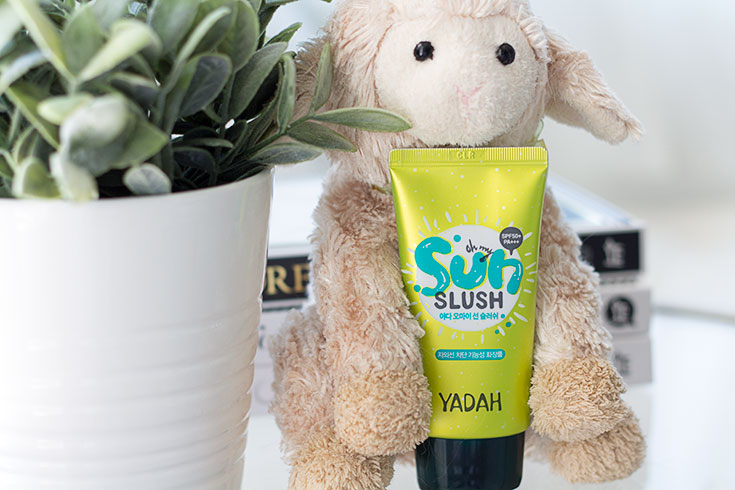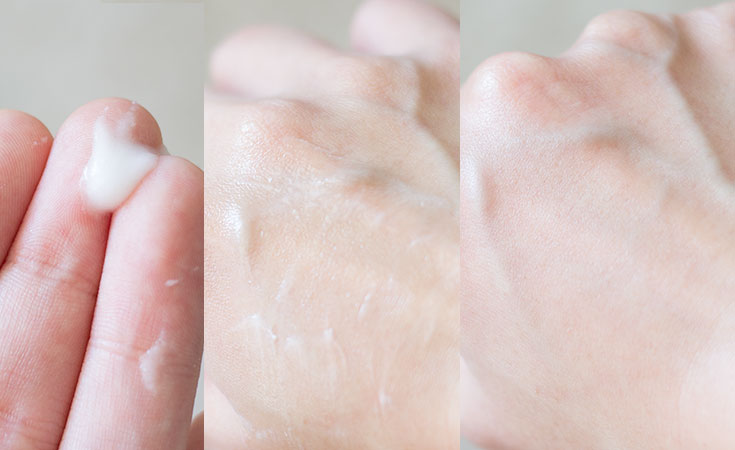Yadah Oh My Sun Slush SPF50 review
Written By Jenny Wu on

- What is it
- A lightweight moisturizing sunscreen with 56% organic prickly pear cactus extract, SPF 50+, and PA+++
- How I use it
- At the end of my AM routine every day, as you should with any sunscreen!!
- Best suited for
- All skin types, especially dry skin
- Key ingredients
- Organic prickly pear cactus extract, centella asiatica extract, portulaca oleracea extract, homosalate (UVB filter), octocrylene (UVB and partial UVA filter), avobenzone (UVA filter) – full ingredient list on CosDNA
- Irritants
- The chemical UV filters might irritate super sensitive folks, and this does have fragrance quite high up the list. Otherwise this is 6-free (no paraben, denatured alcohol, benzophenone, mineral oil, talc, or artificial coloring).
- Packaging
- A standard plastic tube. I’m feeling meh about the cutesy logo and the green color, but I get what they’re going for.
- Scent
- A light fresh scent
- Texture
- Definitely not a slush, which I imagine to be somewhat grainy. Instead this is a light watery gel that’s 100% grain free.
- Finish
- A natural velvety finish. No pilling and plays nicely under makeup.
- What I love
- It’s very light yet hydrating, plus it leaves my skin very soft
- What I dislike
- This is a gripe with Korean sunscreens in general, but why no PA++++? I need all the UVA protection I can get!
- Size & Price
- $15-$17 for 50ml/1.69oz
- Where to buy
- Amazon (US), BB Cosmetics (worldwide)
I generally avoid Korean sunscreens due to their lower UVA protection levels, but I’m glad I tried the Yadah Oh My Sun Slush. Thanks to the 56% prickly pear cactus extract and other soothing ingredients like centella asiatica and portulaca oleracea, it’s hydrating without being heavy. If you have oily skin I’d even suggest skipping moisturizer and just using this sunscreen.

While soothing ingredients are nice to have, the most important ones in a sunscreen are its UV filters, and this sunscreen has 3 chemical ones. That means these filters absorb the UV rays, whereas physical filters deflect the UV rays.
- Homosalate – A UVB filter. This filter gets a lot of bad rep for potentially messing with our hormones and contaminating breast milk due to it getting absorbed into the sun. However, the formula of the sunscreen has significant impact on homosalate’s skin penetration ability (source). But if you are pregnant or lactating it might be best to avoid this filter.
- Octocrylene – A UVB and partial UVA filter. By itself it’s pretty weak, but it works wonderfully to stabilize and even improve the efficacy of other filter (source). There are a few studies that show potential DNA damage due to our skin absorbing it, but not enough to completely rule out its benefits.
- Avobenzone – A UVA filter. By itself it’s prone to degrading quickly in light (ironic huh?), but pairing it with other UV filters like octocrylene can improve its stability.
Personally I have no issues with the above 3 filters, as they are all FDA and EU approved (which means a lot of tests were done to confirm they’re safe when used at the suggested level). Plus they have a much more pleasant texture compared to physical filters, as evident by this sunscreen. Personally I’ve had no averse reactions – breakouts, redness, or tingling – to this sunscreen, but as always, YMMV.
07/27/17 update: In my most recent sunscreen guide, I discussed the importance of the formula being absorption proof to prevent ingredients from penetrating into your skin. After running the spritz test I found that this sunscreen is NOT absorption proof, which means the above ingredients can potentially penetrate into your skin. Yikes.

-
Packaging
7.5
-
Ingredients
6
-
Texture/Application
8.5
-
Performance
5
-
Price
7.5
I was pleasantly surprised by how much I liked this sunscreen, it leaves my skin soft and bouncy with minimal shine. For me this is great everyday sunscreen, but I definitely would use something with higher UVA protection if I was going out. Unfortunately I can no longer vouch for this sunscreen as it is not absorption proof, meaning the ingredients can be absorbed into the skin, some which are not good for our skin or body.
Further reading
- The Story of Yadah Sun Slush – if you want to learn more about how they created and designed this sunscreen
- UV filters chart – a list of the common UV filters and how they work
- The Ultimate Sunscreen Guide – pretty much everything you need to know about sunscreen
- The importance of UVA protection – this is why I’ve got a stick up my butt when it comes to PA/PPD ratings

Passionate about science-based skincare. Tested hundreds if not thousands of products since my 20's. Working regularly with brands like iHerb, Ulta, CurrentBody, and MedStar Health to share my knowledge and experience in all things beauty. Learn more.
Skin profile: 35+, dry/combination, focused on well-aging, hydration, and a healthy glow ✨

Comments & Questions
Hanis
hi may i ask, do i need to take note the absorption proof of other products too? or only sunscreens?
Jenny Wu
Just sunscreen, since you actually want your other skincare products to absorb :)
blue
Hi, may i know which sunscreens are good,safe and cost efficient to use? further, is it reasonable to just use a normal face cleanser to wash off sunscreen?
Jenny Wu
All sunscreens are safe to use, but there can be ingredients that you might be sensitive to like alcohol or essential oils, so you should check the ingredient list if you want to avoid them. As for good, that's subjective. A good sunscreen is one you'll use daily and the correct amount, so it depends on your daily activity - are you outdoors a lot? Then you'll need one with higher UVA/UVB protection than someone who's mostly indoors. You can find plenty of affordable sunscreens from Japanese/Korean brands and I highly recommend those for everyday use, but would recommend the slightly more expensive La Roche Posay Anthelios range if you're outdoors a lot. A good sunscreen is worth spending a bit more on, as it's the most effective antiaging skincare product you can use. I share a few of my recommended sunscreens in these posts
PA? PPD? Broad Spectrum? The ultimate guide to understanding and choosing the best sunscreen
7 sunscreens for all scenarios and skin types
3 outdoors sunscreens reviewed – are you using the right one?
If your sunscreen is labeled as sweat-resistant/water-resistant/waterproof or is tinted, I would recommend double cleansing to fully remove the sunscreen. But for milder sunscreens that do not have such labels, I personally just use a normal cleanser.